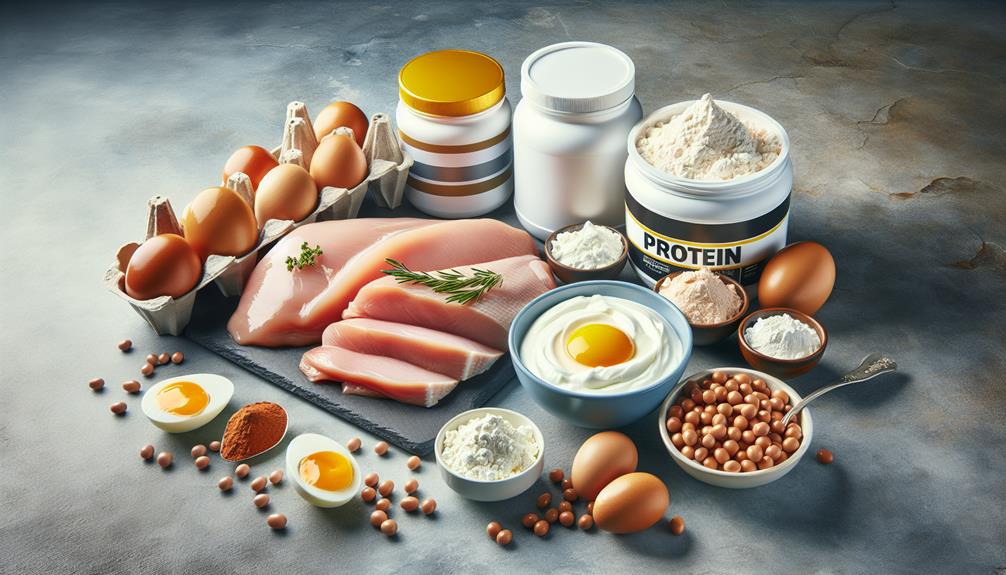When it comes to sculpting and repairing your body's musculature, protein plays a crucial role. You may already be aware of its significance, but have you truly grasped the magnitude of its impact? The truth is, protein is an indispensable component in the process of muscle building and recovery. But why is it so important, and how can you make the most of its benefits? Prepare to uncover the mysteries behind protein's role in enhancing your physique, as we unveil the secrets to maximizing muscle growth and rejuvenation.
Key Takeaways
- Protein is essential for muscle growth and development.
- Consuming protein-rich foods provides necessary amino acids for muscle repair and growth.
- Protein intake should be distributed evenly across meals and prioritize high-quality sources.
- Timing protein consumption before and after a workout optimizes muscle recovery and growth.
Protein and Muscle Growth
How does protein contribute to muscle growth and development? Protein plays a crucial role in muscle growth by facilitating protein synthesis and preventing muscle protein breakdown. When you engage in resistance training or other forms of exercise, you create small micro-tears in your muscle fibers. Protein is necessary for repairing and rebuilding these damaged muscle tissues, leading to muscle growth and development.
Protein synthesis is the process by which the body builds new proteins. When you consume protein-rich foods, such as lean meats, poultry, fish, dairy products, and plant-based sources like legumes and tofu, your body breaks down the proteins into amino acids. These amino acids are then used to synthesize new proteins, which are essential for muscle repair and growth.
In addition to protein synthesis, protein also helps prevent muscle protein breakdown. During intense exercise or periods of calorie restriction, your body may break down muscle protein to use as an energy source. Consuming adequate amounts of protein can help minimize muscle protein breakdown, preserving your hard-earned muscle mass.
To support muscle growth and development, it is recommended to consume around 0.6 to 0.9 grams of protein per pound of body weight per day. Additionally, spreading protein intake evenly throughout the day and combining it with resistance training can maximize its benefits for muscle growth.
The Importance of Amino Acids
Protein synthesis relies on the availability of amino acids, making them essential for muscle growth and development. Amino acids are the building blocks of proteins, and they play a crucial role in various physiological processes. Here are four important points to understand about amino acids:
- Amino Acid Synthesis: The human body can produce some amino acids on its own, while others need to be obtained through diet. The ones that the body cannot synthesize are called essential amino acids, and they must be consumed through food sources.
- Essential vs. Non-Essential Amino Acids: Essential amino acids include histidine, isoleucine, leucine, lysine, methionine, phenylalanine, threonine, tryptophan, and valine. On the other hand, non-essential amino acids can be synthesized by the body and include alanine, arginine, asparagine, aspartic acid, cysteine, glutamic acid, glutamine, glycine, proline, serine, and tyrosine.
- Protein Quality: The quality of a protein source is determined by its amino acid profile. High-quality proteins, such as those found in animal products, contain all the essential amino acids in the right proportions. Plant-based sources of protein may lack certain essential amino acids, so it is important to combine different plant sources to ensure a complete amino acid profile.
- Muscle Recovery: Amino acids, particularly branched-chain amino acids (BCAAs), play a vital role in muscle recovery after exercise. BCAAs, including leucine, isoleucine, and valine, are known for their ability to stimulate muscle protein synthesis and reduce muscle protein breakdown, aiding in muscle repair and growth.
Understanding the importance of amino acids in muscle building and recovery can help individuals optimize their dietary choices and enhance their fitness goals.
Protein's Role in Muscle Recovery

Consuming an adequate amount of protein is crucial for optimal muscle recovery and growth. When you experience an injury or engage in intense exercise, your muscles undergo microscopic damage. Protein plays a vital role in the healing process and muscle repair.
Protein is made up of amino acids, which are the building blocks of muscle tissue. During the recovery phase, your body needs protein to repair the damaged muscle fibers. It provides the necessary amino acids to rebuild and strengthen the muscles.
Research has shown that protein consumption after exercise or injury can enhance the rate of muscle recovery. One study found that consuming protein immediately after resistance training significantly increased muscle protein synthesis, leading to faster repair and recovery.
Protein also plays a role in injury healing. It helps to support the immune system and reduce inflammation, which are crucial for the healing process. Additionally, protein can aid in the production of collagen, a protein that forms the structure of tendons, ligaments, and other connective tissues.
To optimize muscle recovery, it is recommended to consume protein-rich foods such as lean meats, poultry, fish, eggs, dairy products, legumes, and nuts. You can also consider using protein supplements like whey protein powder to ensure you are meeting your protein needs. Remember to consult with a healthcare professional or registered dietitian to determine the appropriate protein intake for your specific needs.
Protein Intake for Building Muscle
To optimize muscle building, it is important to ensure adequate intake of protein-rich foods and supplements. Protein is the building block of muscles, providing essential amino acids that are crucial for muscle growth and repair. Here are some guidelines to help you optimize your protein intake and maximize muscle synthesis:
- Set a daily protein goal: Aim to consume 0.8-1 gram of protein per pound of body weight. This will vary depending on your activity level and goals.
- Distribute protein intake evenly: Divide your protein intake evenly across meals to promote muscle protein synthesis throughout the day.
- Prioritize high-quality protein sources: Choose lean meats, poultry, fish, eggs, dairy products, and plant-based protein sources like legumes and tofu. These sources provide a complete amino acid profile necessary for muscle building.
- Consider protein supplementation: If you struggle to meet your protein requirements through whole foods alone, protein supplements like whey or plant-based protein powders can be a convenient option.
Timing Your Protein Consumption

Timing your protein consumption can play a crucial role in optimizing muscle building and recovery. When it comes to protein intake, the timing of consumption can have a significant impact on your body's ability to build and repair muscles. To help you understand the importance of timing, let's take a closer look at the benefits of pre and post workout protein.
Consuming protein before your workout can provide several advantages. Firstly, it helps to fuel your muscles and prevent muscle breakdown during exercise. Additionally, it can enhance muscle protein synthesis, which is the process that promotes muscle growth and repair. Amino acids from the protein can also increase muscle endurance and improve performance during your workout. To maximize these benefits, aim to consume a protein-rich snack or meal about 30 minutes to an hour before your workout.
Consuming protein after your workout is equally important, as it aids in muscle recovery and growth. Exercise causes muscle damage, and consuming protein post-workout helps repair and rebuild these damaged muscles. Protein also stimulates muscle protein synthesis, promoting muscle growth and adaptation. Aim to consume protein within 30 minutes to an hour after your workout to optimize muscle recovery and growth.
To summarize, timing your protein consumption is crucial for maximizing muscle building and recovery. Consuming protein before and after your workout can provide numerous benefits, including improved muscle protein synthesis, increased endurance, and enhanced muscle repair. Incorporating pre and post workout protein into your routine can help you achieve your fitness goals more effectively.
| Pre Workout Protein | Post Workout Protein | |
|---|---|---|
| Benefits | – Fuels muscles<br>- Prevents muscle breakdown<br>- Enhances muscle protein synthesis<br>- Increases muscle endurance<br>- Improves performance | – Aids in muscle recovery and growth<br>- Repairs damaged muscles<br>- Promotes muscle protein synthesis<br>- Optimizes muscle adaptation and growth |
| Timing | Aim for 30 minutes to an hour before your workout | Consume within 30 minutes to an hour after your workout |
Best Sources of Protein for Muscle Building
Now let's explore the top protein sources that are most effective for building strong muscles. Incorporating high protein foods into your diet is key to achieving your muscle-building goals. Here are four protein-rich options to consider:
- Lean meats: Chicken breast, turkey, and lean cuts of beef are excellent sources of high-quality protein. They are not only low in fat but also contain essential amino acids that promote muscle repair and growth.
- Fish: Fish, such as salmon, tuna, and trout, are not only rich in protein but also high in omega-3 fatty acids. These healthy fats have anti-inflammatory properties and can help improve muscle recovery.
- Eggs: Eggs are a complete protein source, meaning they contain all the essential amino acids your body needs. They are also versatile and can be easily incorporated into various meals, making them a convenient choice for a protein-rich diet.
- Greek yogurt: Greek yogurt is packed with protein and contains fewer carbohydrates compared to regular yogurt. It also contains beneficial probiotics that promote gut health, aiding in digestion and nutrient absorption.
Incorporating these high protein foods into your diet can support muscle building and recovery. Remember to consume a balanced diet and combine protein with carbohydrates and healthy fats for optimal results.
Protein Supplements for Muscle Recovery

Protein supplements can play a beneficial role in aiding muscle recovery after intense workouts. When it comes to muscle recovery, protein shakes and protein bars are popular options among athletes and fitness enthusiasts. These supplements are convenient and provide a quick and easily digestible source of protein, which is essential for repairing and rebuilding muscle tissue.
Protein shakes are a popular choice for post-workout recovery due to their high protein content and fast absorption rate. They are typically made by mixing protein powder with water or milk. Protein shakes come in a variety of flavors and can be customized to meet individual dietary needs. They are a convenient option for those who are on the go or prefer a liquid form of protein supplementation.
On the other hand, protein bars are another convenient option for muscle recovery. They are pre-packaged bars that are high in protein and often contain other nutrients such as carbohydrates and fats. Protein bars are easy to carry and can be consumed immediately after a workout or as a snack throughout the day. They come in various flavors and can be a tasty alternative to traditional protein shakes.
Both protein shakes and protein bars provide a convenient and effective way to support muscle recovery. However, it is important to choose high-quality products that contain adequate amounts of protein and are free from unnecessary additives or fillers. Consulting with a healthcare professional or a registered dietitian can help determine the best protein supplement for your specific needs.
Frequently Asked Questions
Can Protein Intake Alone Lead to Muscle Growth, or Is Exercise Also Necessary?
Protein intake alone is not enough for muscle growth and recovery. Exercise is also necessary to stimulate muscle growth. Protein intake provides the building blocks for muscle repair, but exercise is essential for the actual process of muscle building.
Are All Amino Acids Equally Important for Muscle Building, or Are There Specific Ones That Are More Beneficial?
Some amino acids are more beneficial for muscle building than others. Specific amino acids, known as essential amino acids, are necessary for muscle growth. Non-essential amino acids also play a role, but to a lesser extent.
How Long Does It Take for Protein Consumption to Aid in Muscle Recovery After a Workout?
Protein's magic lies in its ability to speed up muscle recovery after a workout. The rate at which protein is absorbed and synthesized determines how quickly you'll bounce back.
Is There an Optimal Time Window for Consuming Protein After a Workout to Maximize Muscle Growth?
To maximize muscle growth, it's important to consume protein within the anabolic window after your workout. This is the optimal time for protein synthesis, which aids in muscle recovery and building.
Are There Any Specific Diets or Meal Plans That Can Enhance the Effects of Protein Intake on Muscle Building and Recovery?
Specific diets, like the ketogenic diet, can enhance the effects of protein intake on muscle building and recovery. Supplements also play a role in maximizing these effects. Incorporating these strategies into your meal plan can optimize your results.
Conclusion
So there you have it, protein plays a crucial role in both muscle building and recovery. It provides the necessary amino acids for muscle growth and aids in repairing damaged muscle fibers. To maximize your gains, it's important to consume an adequate amount of protein, preferably from high-quality sources such as lean meats, dairy products, and plant-based proteins. Additionally, timing your protein consumption around your workouts can enhance muscle recovery. Remember, protein is the building block of strong and resilient muscles.













